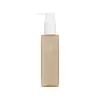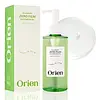What's inside
What's inside
 Key Ingredients
Key Ingredients

No key ingredients
 Benefits
Benefits

 Concerns
Concerns

 Ingredients Side-by-side
Ingredients Side-by-side

Ethylhexyl Palmitate
EmollientTriethylhexanoin
MaskingGlycerin
HumectantCoco-Caprylate/Caprate
EmollientWater
Skin ConditioningPolyglyceryl-10 Myristate
Skin ConditioningPropylene Glycol Laurate
Skin ConditioningKaolin
AbrasiveFicus Carica Fruit Extract
HumectantCentella Asiatica Extract
CleansingCamellia Sinensis Leaf Extract
AntimicrobialHelianthus Annuus Seed Oil
EmollientSimmondsia Chinensis Seed Oil
EmollientHydrogenated Lecithin
EmulsifyingCaprylic/Capric Triglyceride
MaskingSucrose Stearate
Emollient1,2-Hexanediol
Skin ConditioningSucrose Laurate
EmollientSucrose Myristate
EmollientPanthenol
Skin ConditioningZea Mays Germ Oil
EmollientPentaerythrityl Tetra-Di-T-Butyl Hydroxyhydrocinnamate
AntioxidantButylene Glycol
HumectantSucrose
HumectantHyaluronic Acid
HumectantSaccharomyces Ferment Filtrate
HumectantCeramide NP
Skin ConditioningCholesterol
EmollientCitric Acid
BufferingEthylhexyl Palmitate, Triethylhexanoin, Glycerin, Coco-Caprylate/Caprate, Water, Polyglyceryl-10 Myristate, Propylene Glycol Laurate, Kaolin, Ficus Carica Fruit Extract, Centella Asiatica Extract, Camellia Sinensis Leaf Extract, Helianthus Annuus Seed Oil, Simmondsia Chinensis Seed Oil, Hydrogenated Lecithin, Caprylic/Capric Triglyceride, Sucrose Stearate, 1,2-Hexanediol, Sucrose Laurate, Sucrose Myristate, Panthenol, Zea Mays Germ Oil, Pentaerythrityl Tetra-Di-T-Butyl Hydroxyhydrocinnamate, Butylene Glycol, Sucrose, Hyaluronic Acid, Saccharomyces Ferment Filtrate, Ceramide NP, Cholesterol, Citric Acid
Ingredients Explained
These ingredients are found in both products.
Ingredients higher up in an ingredient list are typically present in a larger amount.
Centella Asiatica Extract (Centella) is derived from an herb native to Southeast Asia. It is famous for its anti-inflammatory and soothing properties.
Centella is rich in antioxidants and amino acids, such as Madecassic Acid and Asiaticoside.
Studies show the compounds in centella help with:
The combination of all these properties makes centella effective at soothing, hydrating, and protecting the skin.
Other great components of centella include Vitamin A, vitamin C, several B vitamins, and Asiatic Acid.
Fun fact: Centella has been used as a medicine and in food for many centuries. As a medicine, it is used to treat burns, scratches, and wounds.
Learn more about Centella Asiatica ExtractEthylhexyl Palmitate, also known as octyl palmitate, is created from 2-ethylhexyl alcohol and palmitic acid. It is a fatty acid ester.
The fatty acid content of Ethylhexyl Palmitate makes it an emollient. Emollients help soften and hydrate your skin by trapping moisture within.
Ethylhexyl Palmitate is also used to help improve the texture of cosmetics. It helps other ingredient dissolve in products and help disperse ingredients more evenly.
You'll likely find this ingredient in sunscreen, as it is often used to mix UV-blocking ingredients such as avobenzone and ethylhexyl triazone.
It can also help stabilize the fragrances in a product as a fragrance fixative.
Ethylhexyl Palmitate can be used to substitute mineral oil.
Due to its high fatty acid content, it may not be fungal-acne safe.
Learn more about Ethylhexyl PalmitateHelianthus Annuus Seed Oil is the oil derived from the seeds of a Sunflower. Sunflower seed oil is non-fragrant. It is an emollient, meaning it helps to soften the skin.
Sunflower seed oil contains many fatty acids. The fatty acids found in sunflower seeds include (from highest amount to least): linoleic acid, myristic acid, palmitic acid, stearic acid, arachidic acid, oleic acid, and linolenic acid.
These fatty acids help the skin create ceramides. Ceramides play a role in repairing the skin barrier.
Helianthus Annuus Seed Oil helps moisturize the skin. This in turn helps the skin look more rejuvenated and smoother.
Sunflowers are rich in vitamin E.
Historians believe Indigenous cultures of North America domesticated sunflowers before corn. Thus they relied on sunflower oil for a variety of uses. One such use is moisturizing skin and hair.
Sunflower seed oil may not be fungal acne safe. We recommend speaking with a professional if you have any concerns.
Learn more about Helianthus Annuus Seed OilThis oil comes from the seeds of the desert shrub called Jojoba. It is more commonly known as jojoba oil, a non-comedogenic oil.
Jojoba oil does not contain fragrance and has many fatty-acids, making it a great soothing ingredient.
It also contains Vitamin E, a great moisturizing ingredient. Vitamin E is also an antioxidant and protects your skin against oxidative damage.
This ingredient humectant properties, meaning it helps draw moisture from the air. This helps keep your skin hydrated.
While jojoba has antibacterial properties, it is only able to kill some strains of bacteria.
Studies also show it helps in wound healing. In fact, Indigenous cultures have used jojoba as a moisturizer and to help treat burns for centuries.
Fun fact: Jojoba oil similar to natural human skin sebum, so it has a great effect on dry skin. It is also promising with helping to regulate sebum production.
Due to its fatty acid content, Jojoba oil may not be fungal acne safe. We recommend speaking with a professional if you have any concerns.
Learn more about Simmondsia Chinensis Seed OilWater. It's the most common cosmetic ingredient of all. You'll usually see it at the top of ingredient lists, meaning that it makes up the largest part of the product.
So why is it so popular? Water most often acts as a solvent - this means that it helps dissolve other ingredients into the formulation.
You'll also recognize water as that liquid we all need to stay alive. If you see this, drink a glass of water. Stay hydrated!
Learn more about Water